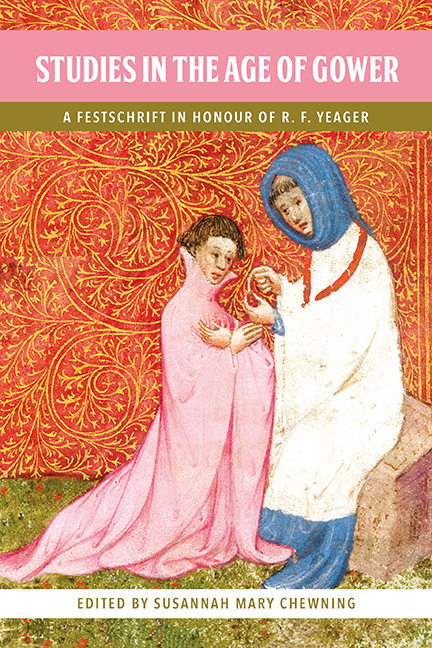Book contents
- Frontmatter
- Contents
- List of Illustrations
- Notes on Contributors
- Acknowledgements
- List of Abbreviations
- Introduction
- Part I Text
- Part II Gender
- Part III Time
- Part IV Spirit
- Part V Intersections
- A Personal Tribute to R.F. Yeager
- Bibliography of R.F. Yeager’s Writings
- General Bibliography
- Index
- Miscellaneous Endmatter
4 - Patriarchy, Family, and Law in Gower’s Confessio Amantis
Published online by Cambridge University Press: 28 April 2020
- Frontmatter
- Contents
- List of Illustrations
- Notes on Contributors
- Acknowledgements
- List of Abbreviations
- Introduction
- Part I Text
- Part II Gender
- Part III Time
- Part IV Spirit
- Part V Intersections
- A Personal Tribute to R.F. Yeager
- Bibliography of R.F. Yeager’s Writings
- General Bibliography
- Index
- Miscellaneous Endmatter
Summary
IN HIS CONFESSIO AMANTIS, John Gower may not be revolutionary in his critique of patriarchy and familial relationships under patriarchal jurisdiction, but no fourteenth-century English writer is more aware of and articulate about the limitations of patriarchal behavior in the practices of his own day. My goal in this essay is to explore, through analysis of the poem's overarching plot-scheme of confession and three of its tales, the shadow lines of patriarchal limitation – the liminal gray area surrounding conceptual presumptions of paternalism. Plots and practices require a playground. In Confessio Amantis that arena is voiced through relationships – relationships between speakers and listeners relative to situations within which their voicing occurs. Gower is not challenging the cultural concepts of patriarchy in which he and his generation live, only the liminal jurisdictions of its ordinances as they are manipulated by people, for good or for ill.
Theologically, patriarchy is enthroned in the familial concept of the Trinity – a Father and Son, unified by the sacred Spirit of Love between them. This familial structure, with its political and social ramifications, at first appears to ignore entirely what we in the twenty-first century might think of as women's rights. But for Gower, in the institution of marriage all soul-bearing humankind is implicitly female. That is, all people, with regard to salvation, become, at least potentially, brides of Christ the Son, whether in daily life, death, or at the Last Judgment. This latter point is important and helps to explain, in part at least, why Gower so frequently focuses on judicious choices by women that move beyond or outside the usual male hierarchies.
Gower is fascinated by law and the way it works. Jurisdiction and its voicing is key to assessing the consequences of patriarchy in Confessio, and in Gower's other great books as well. In all of his writing, he is mindful of the three legal jurisdictions – lex divina, lex naturalis, and lex positiva. Lex positiva is the law normally governing our daily behavior, the system people manipulate for personal advantage or the disadvantage of others. Its codification embodies estates theory and man-made contracts modified according to local demands.
- Type
- Chapter
- Information
- Studies in the Age of GowerA Festschrift in Honour of Robert F. Yeager, pp. 59 - 78Publisher: Boydell & BrewerPrint publication year: 2020

